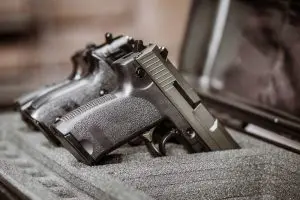FIREARMS AND OTHER WEAPONS
 The United States prosecutes firearms offenses with regularity, whether or not the firearm was used in conjunction with another crime.
The United States prosecutes firearms offenses with regularity, whether or not the firearm was used in conjunction with another crime.
18 U.S.C. § 922 and 924 define what a “firearm” is, and it may surprise you.
- Any weapon (including a starter gun) which will or is designed to or may be “readily converted” to expel a projectile (i.e., bullet) by the action of an explosive;
- the frame or receiver of any such weapon;
- any firearm muffler or firearm silencer; or
- any destructive device.
Thus, one can be prosecuted for being in possession of a firearm even if it is completely inoperable at the time of the alleged offense. One could also be prosecuted federally for being in possession of a starter gun, which is designed to make a loud noise and shoot nothing, as it could be “readily converted” to shoot.
Possession of Prohibited Firearms
Federal law also prohibits the possession of firearms with removed or obliterated serial numbers.
Several types of firearms and other weapons are illegal to possess without a license for the weapon issued by the Bureau of Alcohol, Tobacco, and Firearms (ATF). They include:
Automatically firing weapons, called machine guns, that were manufactured after May 19, 1986 also illegal to possess without such a license.
Short-barreled shotguns (barrel length of less than 18” or overall length of less than 26”)
Short-barreled rifles (barrel length of less than 16″ or overall length less than 26″)
Silencers (defined as any device that is designed to muffle, silence, or diminish the report (sound made when fired) of a portable firearm
Possession of Firearms by a “Prohibited Person”
Possession of a firearm by a “prohibited person” is illegal. There are nine categories of persons who are prohibited from possessing a firearm in the United States. These include:
- Felons
- Fugitives
- Illegal drug users of or addicts to a controlled substance
- Individuals who have been determined to be mentally “defective” by a court or who have been involuntarily committed to a mental institution
- Illegal aliens and non-immigrant aliens
- Veterans dishonorably discharged from the armed forces
- Individuals who have renounced their U.S. citizenship
- Individuals who are the subject of a qualifying domestic protection order
- Individuals convicted of a misdemeanor crime of domestic violence.
A prohibited person cannot possess, ship, transport or receive a firearm or ammunition that has traveled in interstate commerce.
The Interstate Commerce Clause
In order to establish federal jurisdiction in these cases, the firearm involved must have traveled in “interstate or foreign commerce.” This may sound complicated, but the reality is not. The U.S. Attorney need only prove that the firearm or ammunition crossed a state or international line at some point in its history. For example, if the firearm was manufactured in Massachusetts – or Germany – and is recovered in Florida, the interstate nexus requirement has been satisfied. If the firearm was made in Florida and recovered in Florida, but it was used to commit a crime in yet another state during the interim, this will also be sufficieint evidence of the commerce requirement.
Possession of a Firearm Used in Drug Trafficking Offense or to Commit a Crime of Violence
Using or carrying a firearm during or in relation to, or possessing a firearm “in furtherance of,” drug trafficking or a crime of violence that can be prosecuted in federal court. The penalties for these acts are among the most severe in the federal system. These crimes are prosecuted under 18 U.S.C. 924(c).
Proof of interstate commerce is not required
Because the primary offense (drug trafficking or a crime of violence under federal jurisdiction) is prosecutable in federal court, there is no interstate nexus requirement for the gun itself.
The Penalties for a Violation of § 924(c)
Possessing most firearms in furtherance of a drug trafficking crime or crime of violence will result in a five year minimum mandatory sentence. This must be consecutive to the sentence for the drug crime or violent crime. Actions with the firearm beyond mere possession (brandishing, threatening, discharge) will result in higher minimum sentences.
A conviction for a second or subsequent firearm carried or used in furtherance of these crimes will result in a 25 year minimum mandatory sentence, which must be sentenced consecutively to the underlying offense and the first firearm.
What you should know
If you have been charged with a violent crime or a drug offense and firearms may be involved, retain an experienced federal defense lawyer immediately. In many instances, the proof of the firearm’s use is insufficient to prove a charge under 18 U.S.C. 924(c). The draconian minimum penalties under this statute require a focused defense and experience in dealing with such charges. Jonathan Rose has successfully defended such charges and prevented their filing in others.
